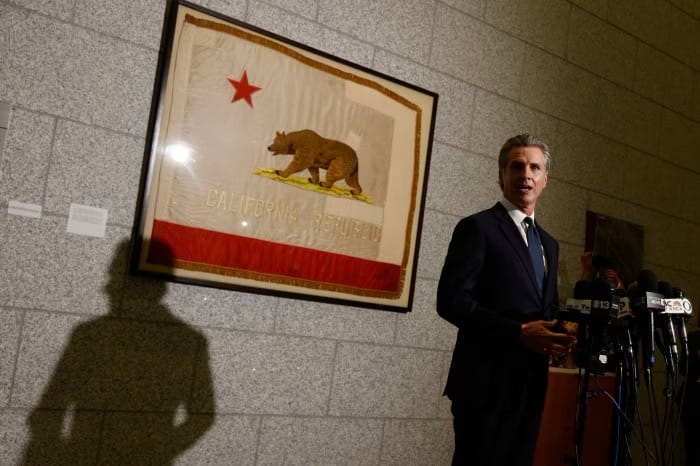July 1 2025
Big Beautiful Bill Drama; Newsom Tackles Housing; Trump To Host Netanyahu; Amazon Robots; China-Russia-NK Axis

GOP Races to Secure Votes for Sweeping Tax Bill Amid Party Divisions
To Tackle Housing Crisis, Newsom Forces Through Changes to Signature Environmental Law
Trump to Host Netanyahu for White House Talks on Gaza Ceasefire
Amazon Nears Robot-Human Parity in Its Warehouses
U.S. Strikes on Iran Test Tehran's Alliances with Russia, China, NK
Newsletter sponsor

1. GOP Races to Secure Votes for Sweeping Tax Bill Amid Party Divisions
Senate Republicans were racing on Tuesday morning to lock down the votes to pass their sweeping tax and domestic policy bill, after an all-night session of voting and negotiating with holdouts left President Trump’s agenda hanging in the balance. Debate on the package stretched into a third day as party leaders pressed to keep the legislation on track to meet Mr. Trump’s deadline of enactment by July 4. All day Monday and into the early hours of Tuesday morning, Republicans held firm against numerous Democratic efforts to challenge every element of the measure, particularly its cuts to Medicaid and federal nutrition programs, as well as tax cuts for the wealthy. But the bigger challenge for the G.O.P. was the nagging reservations in its own ranks over the bill, which polls have shown to be deeply unpopular with voters. Fiscal hawks upset that the measure would pile at least $3.3 trillion onto an already soaring national debt were pressing for bigger cuts to Medicaid to offset more of the cost. Moderate Republicans were agitating to scale back the bill’s cuts, fearing the impact on their constituents’ access to health care coverage and other government services. The legislation would extend roughly $3.8 trillion in tax cuts enacted in 2017 that are slated to expire at the end of the year, and add new tax cuts Mr. Trump campaigned on, including for tips and overtime pay, while bolstering funds for national and border security. To cover part of the enormous cost, it would slash spending on Medicaid and federal nutrition assistance, as well as clean energy programs. And it would raise the federal debt limit by $5 trillion. With Democrats uniformly opposed to the legislation, Republican leaders were pushing the measure through Congress using special rules that shield it from a filibuster and require only a majority for passage. Still, they could afford only three defections from senators in their own party — and even then, they would need Vice President JD Vance to break a tie. So far, two Republicans, Thom Tillis of North Carolina and Rand Paul of Kentucky, have said they will not vote for the measure. But as night fell on Monday, at least a half-dozen other Republican senators had issues that remained unresolved, with several pointing to specific policy concerns that they said could make or break their decisions and that had yet to come to a vote.
NYT
2. To Tackle Housing Crisis, Newsom Forces Through Changes to Signature Environmental Law
California lawmakers on Monday night rolled back one of the most stringent environmental laws in the country, after Gov. Gavin Newsom muscled through the effort in a dramatic move to combat the state’s affordability crisis. The Democratic governor—widely viewed as a 2028 presidential contender—made passage of two bills addressing an acute housing shortage a condition of his signing the 2025-2026 budget. A cornerstone of the legislation reigns in the California Environmental Quality Act, which for more than a half-century has been used by opponents to block almost any kind of development project. The abuses of the law have spread so widely that opponents used it to block some bicycle-lane expansions when Newsom served as San Francisco’s mayor, he said during a signing ceremony at the Sacramento capital. Democratic leaders of the Assembly and Senate, who had steered the bills to bipartisan passage earlier Monday, flanked him. “We have seen this abuse over and over and over again,” the governor said. “We have fallen prey to a strategy of delay. As a result of that, we have too much demand chasing too little supply. This is not complicated, it is Econ 101.” Some environmentalists and other defenders of the longstanding law were furious, and warned that developers will now go unchecked. “Who needs Trump when we have a wolf in sheep clothing negotiating back room deals while he and his oligarch donors score big,” one critic wrote on X. The lack of affordable housing has climbed to the top of voter concerns in other coastal blue strongholds. New York City’s brutal rental market became a flashpoint in the city’s recent Democratic primary for mayor, and helped propel Zohran Mamdani to victory. But California sits at the epicenter of America’s home shortage. The state has faced a homelessness crisis. And nine of the 10 least affordable cities in the country are located there, according to a May 20 report by WalletHub, a personal finance company. And the heart of the problem, say housing experts, are the regulatory barriers to construction. The state needs 3.5 million units, but only about 100,000 are built annually.
WSJ
3. Trump to Host Netanyahu for White House Talks on Gaza Ceasefire
WASHINGTON — President Donald Trump will host Israeli Prime Minister Benjamin Netanyahu for talks at the White House next Monday as the U.S. leader steps up his push on the Israeli government and Hamas to broker a ceasefire and hostage agreement and bring about an end to the war in Gaza. The impending visit was confirmed by two U.S. administration officials who spoke on the condition of anonymity because they were not authorized to comment publicly on it. The trip will be Netanyahu’s third visit to the White House since Trump returned to office in January, and it comes after the United States inserted itself into Israel’s war against Iran by attacking Iranian nuclear sites . After brokering a ceasefire between the two countries, Trump has signaled that he’s turning his attention to bringing a close to the fighting between Israel and Hamas.
WaPo
4. Amazon Nears Robot-Human Parity in Its Warehouses
The automation of Amazon.com facilities is approaching a new milestone: There will soon be as many robots as humans. The e-commerce giant, which has spent years automating tasks previously done by humans in its facilities, has deployed more than one million robots in those workplaces, Amazon said. That is the most it has ever had and near the count of human workers at the facilities. Company warehouses buzz with metallic arms plucking items from shelves and wheeled droids that motor around the floors ferrying the goods for packaging. In other corners, automated systems help sort the items, which other robots assist in packaging for shipment. One of Amazon’s newer robots, called Vulcan, has a sense of touch that enables it to pick items from numerous shelves. Amazon has taken recent steps to connect its robots to its order-fulfillment processes, so the machines can work in tandem with each other and with humans. Now some 75% of Amazon’s global deliveries are assisted in some way by robotics, the company said. The growing automation has helped Amazon improve productivity, while easing pressure on the company to solve problems such as heavy staff turnover at its fulfillment centers.
WSJ
5. U.S. Strikes on Iran Test Tehran's Alliances with Russia, China, NK
From June 25, 2025 - they didn’t intervene militarily, but will they help rebuild?
As Iran reels from its gravest threat in decades, its alliance with China, Russia and North Korea—an axis that has increasingly alarmed the U.S. and allies—is facing a vital test: Will its partners come to its aid? Beijing, Moscow and Pyongyang could offer Iran crucial assistance to recover from the damage inflicted by U.S. and Israeli strikes on its nuclear program and arsenal of conventional weapons. That could deepen the alliance, sending a powerful signal for potential conflicts in Taiwan, the Korean Peninsula and Eastern Europe. Indeed, the three powers helped Iran build the nuclear program that the U.S. and Israel have tried to destroy. The Isfahan facility, Iran’s largest nuclear-research complex and a prime target of the U.S. strikes, was built with Chinese assistance when it opened in 1984, according to the nonprofit Nuclear Threat Initiative. Three small, Chinese-supplied research reactors operate there. North Koreans helped design the underground tunnels used in Iran’s nuclear sites. Moscow has said hundreds of Russian nuclear experts currently work inside Iran. But China, Russia and North Korea don’t appear eager to rush to Iran’s side. A big reason: President Trump’s decision to insert the U.S. into Israel’s assault on Iran by striking the country’s nuclear facilities has made helping Tehran recover far riskier and more geopolitically fraught.
WSJ
July 1, 1963: U.S. Post Office introduces zip codes

Sign up for local news delivered to your inbox in:
Many more cities coming soon!
See the citizen journal Podcast! Released on Apple and Spotify around 10a CST.
Sponsors (click me!)





SUBSCRIBE TO GET THE CITIZEN JOURNAL IN YOUR INBOX - FREE!
subscribe/unsubscribe to city emails, subscribe to app notifications, get the app
Sources
- https://www.nytimes.com/2025/07/01/us/politics/senate-trump-bill.html?smid=url-share
- https://www.wsj.com/us-news/california-dismantles-landmark-environmental-law-to-tackle-housing-crisis-44486b30?mod=hp_lead_pos2
- https://www.washingtonpost.com/politics/2025/06/30/trump-netanyahu-israel-hamas-iran/0f80211c-55f0-11f0-b45b-dc9aeb848c03_story.html
- https://www.wsj.com/tech/amazon-warehouse-robots-automation-942b814f?mod=hp_lead_pos7
- https://www.wsj.com/world/iran-china-russia-north-korea-alliance-2aab00a0?st=rHucLS&reflink=article_copyURL_share
Contact: greg@loql.ai

